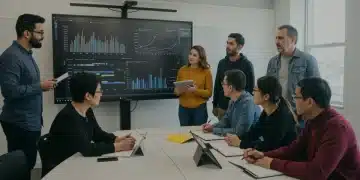Online programs in environmental sustainability: your path to a greener future

Online programs in environmental sustainability provide flexible, accessible education that equips individuals with practical skills and knowledge to address pressing environmental issues and prepare for growing career opportunities.
Online programs in environmental sustainability are becoming increasingly popular as more people seek ways to contribute to a healthier planet. Have you ever wondered how these programs could fit into your life? Let’s dive in!
Understanding environmental sustainability
Understanding environmental sustainability is essential in today’s world. It focuses on meeting our needs without compromising the ability of future generations to meet theirs.
To grasp this concept better, let’s explore the key principles that define environmental sustainability and why they matter.
Key Principles of Environmental Sustainability
These principles serve as the foundations for sustainable practices:
- Conservation of resources: Using natural resources wisely ensures they remain available for future use.
- Reduction of waste: Minimizing waste through better management and recycling is crucial for sustainability.
- Protection of ecosystems: Safeguarding natural habitats helps maintain biodiversity and ecological balance.
- Promotion of renewable energy: Utilizing energy sources like solar and wind reduces reliance on fossil fuels.
The relationship between humans and the environment plays a vital role in sustainability. By understanding how our actions impact the planet, we can make better choices. For instance, adopting a sustainable lifestyle not only helps the environment but also fosters a sense of community and responsibility.
Moreover, education plays a key role in promoting environmental sustainability. Schools and programs focusing on sustainability prepare individuals to tackle ecological challenges. By incorporating sustainability into curricula, we encourage future generations to prioritize our planet’s health.
As individuals, we can contribute to environmental sustainability through simple actions. This can include making sustainable choices in our daily lives, from reducing plastic usage to supporting local produce.
Benefits of online programs
Online programs offer numerous benefits for those interested in environmental sustainability. They provide flexibility, allowing learners to study at their own pace and in their own time. This accessibility makes education in sustainability more achievable for everyone.
One of the key advantages of online programs is the variety of courses available. Students can choose programs that match their interests and career goals, whether it’s renewable energy, conservation, or sustainable development. With so many options, individuals can tailor their learning experience.
Flexible Learning Environment
Online programs enable students to balance coursework with personal and professional commitments. This flexibility means that anyone, regardless of their situation, can pursue their passion for sustainability.
- Study from anywhere: Learn from the comfort of your home or while traveling.
- Work at your own pace: Complete coursework at a speed that suits your schedule.
- Access to global experts: Engage with instructors and peers from around the world.
- Diverse learning resources: Utilize various materials like videos, articles, and interactive activities.
Additionally, online programs often feature community engagement. Many schools incorporate discussion forums and group projects, fostering a sense of connection among students. This helps enrich the learning experience and encourages collaboration, critical for tackling real-world sustainability challenges.
Finally, the cost-effectiveness of online programs can not be overlooked. They often have lower tuition fees compared to traditional classroom-based programs. Plus, students save on commuting and housing expenses, making education more financially accessible. Overall, these benefits make online programs a vital option for those looking to enhance their knowledge and skills in environmental sustainability.
How to choose the right program for you

Choosing the right online program in environmental sustainability can feel overwhelming. However, by considering a few critical factors, you can make an informed decision. Start by identifying your personal interests and career goals. Are you passionate about renewable energy, conservation, or sustainable agriculture? Knowing your focus will guide your choice.
Next, research different programs and their curriculums. Look for institutions that offer courses relevant to your interests. Be sure to check their course formats, such as whether they offer live classes or pre-recorded lectures. Understanding how the program is structured will help you fit it into your schedule.
Key Factors to Consider
- Accreditation: Ensure the program is recognized by relevant educational authorities.
- Faculty expertise: Review the backgrounds of instructors to find experts in the field.
- Course flexibility: Look for programs that allow a balance between study and work.
- Support services: Check if they offer career counseling and academic advice.
Another important aspect is the community and networking opportunities. Engage with current or former students to learn about their experiences. Online forums or social media groups can provide insight into the program’s culture and support.
Lastly, consider the financial aspects. Analyze the tuition fees, and investigate if financial aid or scholarships are available. Balancing quality education with your budget is crucial, so ensure the investment aligns with your financial situation.
Real-world applications of sustainability education
Real-world applications of sustainability education are transforming communities and industries. By applying knowledge gained through online programs in environmental sustainability, individuals can make significant changes. These applications are not confined to traditional environmental sectors; they span various fields and have a profound impact.
For instance, businesses are increasingly adopting sustainable practices. Many companies implement green initiatives to reduce waste and lower their carbon footprint. This could include using renewable energy, improving energy efficiency, or sourcing materials responsibly. As a result, organizations not only contribute to a healthier planet but also enhance their reputation and profitability.
Case Studies of Successful Sustainability Initiatives
Several projects highlight the effectiveness of sustainability education:
- Urban gardening: Community gardens promote local food production while educating citizens about sustainable agriculture.
- Waste management programs: Cities that educate residents on recycling help reduce landfill waste significantly.
- Corporate sustainability reports: Companies that disclose their environmental impact attract environmentally-conscious consumers.
Beyond businesses, sustainability education drives innovation in technology. Emerging technologies, such as smart grids and sustainable transportation systems, rely on principles learned in sustainability courses. By understanding these concepts, graduates are equipped to lead projects that address critical environmental issues.
In education, schools incorporating sustainability topics create a generation more aware of ecological challenges. Students engage in projects that develop problem-solving skills essential for tackling real-world environmental issues. For example, implementing renewable energy sources in schools serves as a practical learning experience and reduces costs.
Future trends in environmental sustainability education
Future trends in environmental sustainability education are becoming increasingly important as awareness of climate change grows. As the world faces environmental challenges, education systems are adapting to prepare individuals for a sustainable future. Innovations in teaching methods and technology greatly enhance this learning experience.
One key trend is the integration of technology in the classroom. Online courses and virtual learning platforms are expanding access to sustainability education. This allows students from various backgrounds to engage in sustainability topics regardless of their location. Moreover, interactive tools and simulations help students visualize complex concepts.
Emerging Educational Approaches
Another trend is experiential learning. Schools and universities are focusing on hands-on experiences that allow students to apply their knowledge in real-world situations. This learning approach can include:
- Fieldwork: Students participate in local conservation projects or community sustainability initiatives.
- Internships: Companies offer opportunities for students to gain practical experience in sustainable practices.
- Collaborative projects: Students work together to solve environmental issues, enhancing teamwork and problem-solving skills.
Additionally, there is a growing emphasis on interdisciplinary education. This approach combines various subjects, such as science, economics, and social studies, to provide a comprehensive understanding of sustainability. Students learn how environmental issues intersect with other fields, preparing them for diverse career paths.
Another important trend is the rise of global citizenship education. As sustainability challenges are often global, teaching students to think critically about their role in the world is essential. Programs that promote cultural awareness and responsibility encourage students to think about the global impact of their actions.
Finally, as sustainability concerns evolve, educators are focusing on adaptive curricula that stay relevant. This means regularly updating course materials to reflect the latest science and practices. By keeping education current, schools can effectively prepare students for future challenges in sustainability.
In conclusion, pursuing online programs in environmental sustainability equips individuals with the knowledge and skills to tackle pressing global challenges. These programs are flexible, accessible, and offer various ways to engage with the material. As sustainability education evolves, it emphasizes real-world applications, the integration of technology, and the importance of interdisciplinary approaches. Graduates of these programs are not only prepared to enter a growing job market but also become advocates for a healthier planet. With a focus on the future, education in sustainability empowers people to make informed decisions that positively impact both their lives and the environment.
FAQ – Frequently Asked Questions about Online Programs in Environmental Sustainability
What are the benefits of online programs in environmental sustainability?
Online programs offer flexibility, accessibility, and a wide range of courses that allow individuals to learn at their own pace.
How can sustainability education impact my career?
Sustainability education prepares you for a growing job market, equipping you with skills to address environmental challenges in various fields.
What types of real-world applications can I expect from this education?
You can expect to engage in community projects, internships, and hands-on experiences that apply sustainability principles to real-life situations.
How do I choose the right online program for me?
Consider factors like your interests, the curriculum offered, accreditation, and the support services available before making a decision.





